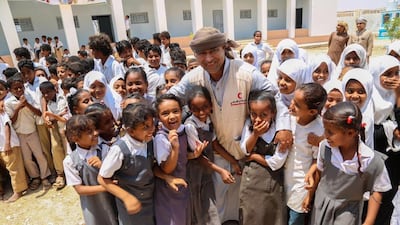UAE aid to Yemen between April 2015 and November 2017 reached a staggering Dh9.4 billion ($2.56bn).
The UAE, represented by the Emirates Red Crescent (ERC), intensified its humanitarian campaign in 2017 and its efforts were detailed in a wide-ranging report by Wam.
Six of Yemen's primary sectors were targeted by the ERC in 2017: education, health, security, relief, infrastructure and housing.
Yemen's healthcare system has been badly affected by the war, with a severe cholera outbreak and shortages of vital medicines, personnel and equipment.
According to Nasser Baoum, Yemen's minister of health, the UAE played a major role in limiting the spread of cholera, including an airlift of 100 tonnes of medication and supplies.
The UAE has also provided $100 million to support efforts to combat the epidemic, as well as 10 containers of cholera medicine, which were received by the World Health Organisation for delivery through its regional centres.
Throughout 2017, the ERC also supported the National Programme to Combat Malaria in Yemen by delivering medicine and 100,000 insecticide-treated bed nets.
Hospitals have been renovated and new facilities built, and ambulances and medical equipment supplied.
For example, the ERC inaugurated the General Hospital in Al Najdayn, Hadramaut, as well as the Hijr Hospital, Ataq Central Hospital, the General Hospital in Mocha and Al Sadr Centre in Mukalla District. It also renovated several other healthcare facilities across the country.
The ERC also launched the first free surgical camp in Ataq District, Shabwa Governorate, and supported child immunisation campaigns by providing solar refrigerators. It also gave 20 ambulances to the WHO.
The conflict in Yemen has now been going on for about three years. The Saudi-led coalition, of which the UAE is a part, is fighting against Iranian-backed Houthi rebels in support of Yemeni troops loyal to the internationally recognised government of president Abdrabu Mansur Hadi.
More than 10,000 people have died and the country is on the brink of famine, with Sana’a still controlled by Houthis.
But efforts by the UAE have done much to alleviate the humanitarian crisis.
Turning to education, many new schools were built and others refurbished by the UAE during 2017. Four academic halls in Aden University's science college were given 200 seats, projectors and computers. Hundreds of buses have been given to Yemeni schools and universities to ensure smooth transportation for students, especially those who live in remote rural areas. A new initiative, dubbed "school bag", distributed school clothes to many needy Yemeni families.
Yemen's infrastructure also benefited from UAE aid. The ERC launched hundreds of infrastructure and housing developments during the year. The Al Makha Steam Station was restored, for example, and a deal signed to restore the 120-megawatt Al Makha Power Station.
Dozens of projects were also announced to enhance the the water sector, including the digging of wells in many areas.
In December, Yemen's ex-president Ali Abdullah Saleh was killed. It came just days after he said he was breaking with the Houthis and would consider a new era in relations with the coalition if attacks ceased. The coalition is now tightening its grip on Houthi stronghold Saada while simultaneously advancing on Sana'a.
________________________
Read more:

